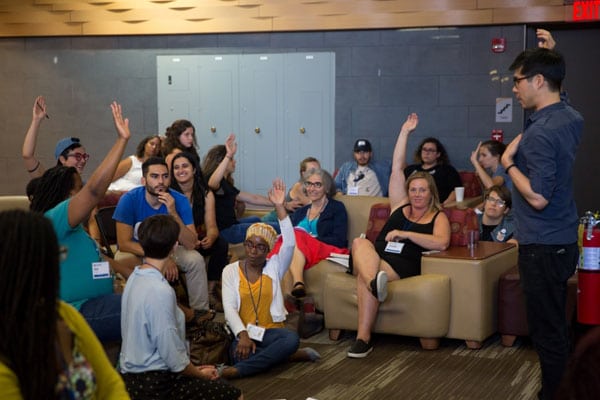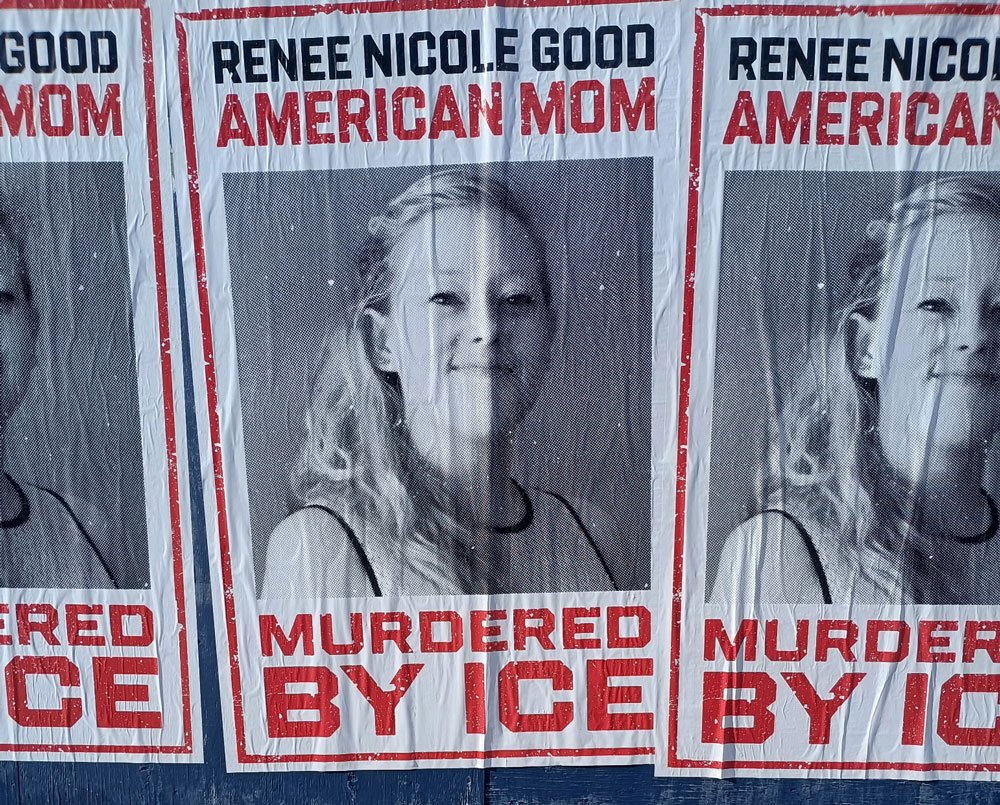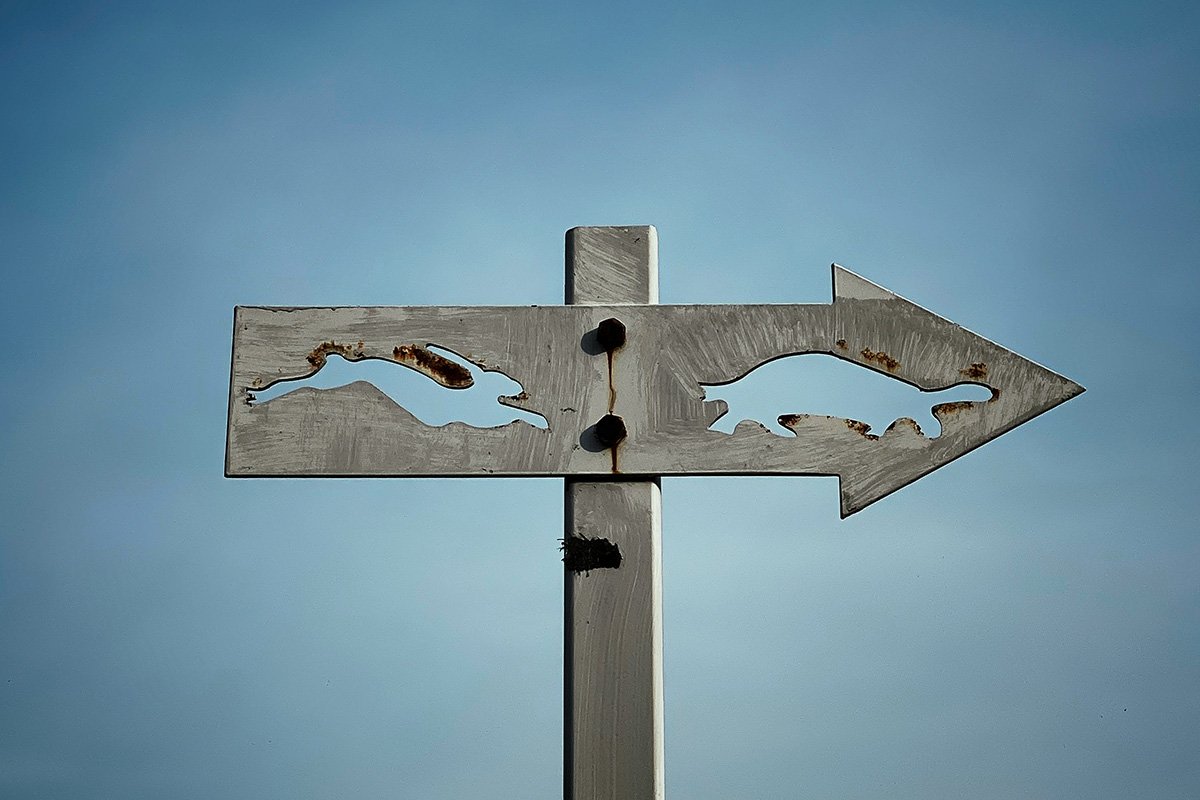
Last month, several hundred activists tied to a membership organization known as the New Economy Coalition gathered in St. Louis at the organization’s biennial CommonBound conference—the first to take place since the 2016 national election.
The conference, held on June 22–24, 2018, and attended by well over 400 people, involved a wide range of half-day and day-long networking sessions, over four dozen different workshops, and two plenary sessions that occurred on the main stage. Video recordings of the two plenary sessions and four conference workshops are available here. The topics were wide-ranging, including everything from the state of social movements in Puerto Rico; to efforts in a range of countries, including Canada, Cuba, Great Britain, Mexico, and Spain; to local struggles for clean energy and against displacement stemming from gentrification.
At the conference’s opening, Ed Whitfield of the Greensboro, North Carolina-based Fund for Democratic Communities noted that, “Oppression breeds resistance. But we have to figure out how to build. That brings us here.” The plenary sessions addressed this question by focusing on two themes: owning the moment and owning local power. At each session, activists engaged in discussions of how best to move from the current moment where US society finds itself to building a movement that can result in building lasting equity and a more democratic economy.
Owning the Moment
The conference’s opening plenary was titled “Owning the moment” and involved a conversation among three activists: M. Adams, Co-Executive Director, Freedom, Inc.; Ash-Lee Woodard Henderson, Co-Executive Director of the Highlander Research and Education Center; and Makani Themba of Higher Ground Change Strategies in Jackson, Mississippi.
Themba said that to own this moment—one marked by the emergence of highly visible white supremacist violence, reinforced by White House support—means taking on new challenges. On a positive note, however, Themba observes that, “My dream is that we step into this moment. We are getting closer and closer. More things are being named.” Henderson called for translating movement concepts into “regular-people speak. What makes me excited about CommonBound is that you’re interrogating things. How do we make this conversation just as alive back home?”
For her part, Adams noted that, “Anything is possible, both in a good, forward sense and also a back, repressive sense. Our movements can only be as big as our dreams.” For this reason, Adams said, it is “imperative to take seriously the vision question.”
Building that vision, according to Themba, involves building on local knowledge. Themba, who is based in Jackson, Mississippi, which elected a Black nationalist mayor last year, notes that she is “in this place where there is amazing experimentation. We are taught competition is natural.” We are told, Themba says, that economic alternatives “can’t work. But what we do is bust those myths in places. Part of it is doing the work and also telling the stories. It is not only possible, but people are doing it in spaces. In Buffalo, too, we are having conversations with people who are actually putting these principles in practice.”
Henderson called on conference-goers to “look at the South. Learn from the South. Amplify the South.” As we noted in NPQ a few months ago, “One doesn’t have to follow history too closely to recognize the critical importance and role of the South to the cause of equity nationally.”
Henderson also added, “Our elders and ancestors say by ‘any means necessary.’ They mean all of them. Unions, worker centers, worker co-ops…. We need to not be in silly fights about tactics. We need a multi-tactic strategy.”
Building the Movement from the Ground Up
The conference’s second plenary, with the theme of “owning local power,” picked up where the first left off. Early on, Rebecca Kemble, an alderperson (city council member) in Madison, Wisconsin and board member of CICOPA, the leading international federation of worker cooperatives, observed that “organized money has captured the national government”—and, in her state of Wisconsin, the state government as well. But Kemble also expressed confidence that the current state of affairs can be upended. Ultimately, Kemble said, “Power is in our relationships and our ability to trust each other. If we can figure that out, we’re going to survive, no matter what happens.”
Sign up for our free newsletters
Subscribe to NPQ's newsletters to have our top stories delivered directly to your inbox.
By signing up, you agree to our privacy policy and terms of use, and to receive messages from NPQ and our partners.
Kemble was part of a panel, moderated by Eli Feghali of the New Economy Coalition, that also included Jorge Díaz Ortiz, artistic director of AgitArte—based in the Santurce neighborhood of San Juan, Puerto Rico—and Doria Robinson, executive director of Urban Tilth and a board member of Cooperation Richmond, based in Richmond, California. Richmond is a working-class community about 12 miles north of Oakland that abuts the Chevron refinery, a place that Robinson notes is the “single largest point source of emissions in the state of California.”
Each of the speakers spoke to the local political challenges they face. In Richmond, the leading ones are affordable housing and gentrification. Robinson said that the city, which was roughly 50 percent Black in 1990, is only 22 percent Black today. “The pressures are intense,” Robinson added. Activists in Richmond were able to pass limited rent control, but “it doesn’t protect people renting single-family homes or homes constructed after 1995.” A November 2018 statewide ballot initiative, however, if passed, would give cities like the Richmond the ability to extend rent control protections more broadly. Robinson also said the city needs more cooperative housing and community land trusts.
In Madison, Kembel was drawn into city politics less by a challenge than a political opportunity. “About three years ago, our mayor announced he was going to invest $5 million in a worker co-op development project.” Kembel decided she could “either complain or get a seat at that table—and I won. And I have been working as a city councilor for the past three years. I see the city as a giant co-op—this is common money; we can organize our city government as a public co-op and make decisions to drive resources to where they are really needed.”
In San Juan, Díaz Ortiz noted that his group shifted their work in the face of Hurricane Maria and imposed austerity from a fiscal control board. “We see culture as fundamental to the work that we do,” he said, even if sometimes immediate needs mean that the most important work is to feed folks or take water to people.
Díaz Ortiz noted that Puerto Rico’s “history is a history of displacement” involving 120 years of colonialism. Díaz Ortiz observed that towns in Puerto Rico have been destroyed both by “the hurricane and by the disaster capitalism. It has been a great opportunity for the government and the fiscal control board. Making millions and pushing austerity measures on our people.” Díaz Ortiz added, “It’s interesting how disaster capitalism can take advantage of the situation” rather than “doing the solidarity work that needs to happen.”
This emphasis on local action, even in the face of global challenges on the scale of those faced by places like Puerto Rico, permeated the conference—including the opening plenary, a panel on municipalism, and a session on leveraging local community investment for social change, which involved many of the participants featured here. On this panel, Kemble also raised the theme; “All of the work has to be local,” said Kemble.
Fighting global capital has to be local. How do you get people motivated? To me, it comes down to love. We defend and protect the people, places and relationships we love. Our power is based on deep values of caring for each other and the water and the planet. It is so important to build international relationships and intranational relationships.… We need to talk about what those values are and get very clear about that because those relationships and values are the essence of what we are doing.
Moving Beyond the Local: The Importance of Institutions
The panelists, however, also noted that while organizing and building local power was important, more was needed. Díaz Ortiz emphasized the importance of building institutions: “We have to develop long-term, working-class institutions that contest power,” Díaz Ortiz said. “Relationships are our strength, but it is also our weakness because those are so hard. We need to build institutions.” For Díaz Ortiz, building strong working-class institutions needs to be a core element of long-term movement strategy.
Robinson concurred. “We need to be clear about the institutions that we create,” Robinson said. “We need to have a particular small set of specific institutions in place. Not just movement organizations, but a public bank, a land trust, that can create the skeleton that can continue to grow the kind of the economy we want to create. We have to have people who are willing to be the public banker. It is so much easier to be the movement organizer [but] we need people who are willing to run the economy and look for someone else to do that for us. There are not enough people who are actually willing. This is it. It is not going to be glamorous. It is going to be transformative. Nurturing up those people and those institutions will get us a really far way.”












